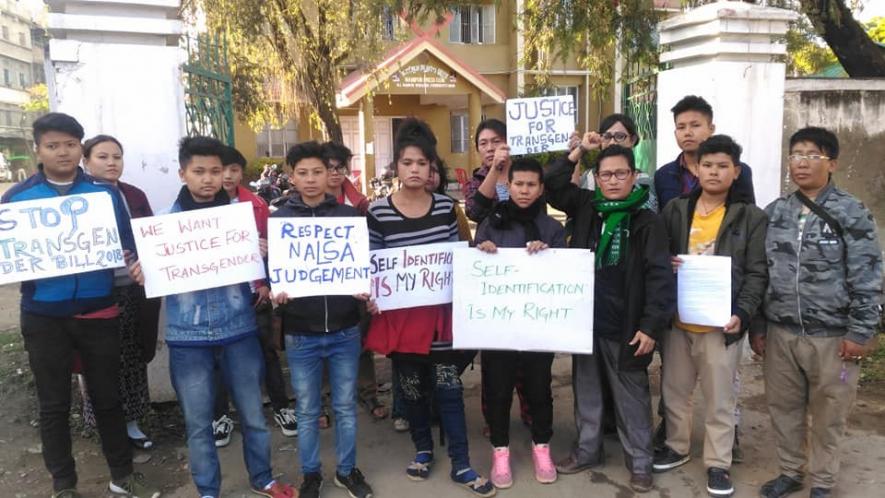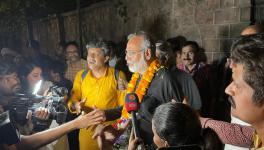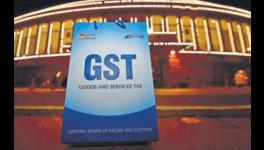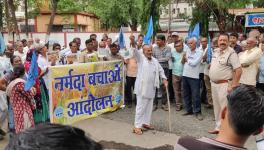Transgender Bill: Denying Constitutional Rights to the Community?

On Dec 17, 2018, the Lok Sabha passed the Government of India's Transgender Persons (Protection of Rights) Bill, 2018. Amidst the heated debate regarding the Rafale deal in the Lower House, the decision that would affect lives of lakhs of transgender people was taken within a short span of an hour. The passed Bill was introduced by the current Bharatiya Janata Party-led central government, watering down the already existing Rights of Transgender Persons Bill, 2014, passed in the Rajya Sabha.
On April 15, 2014, the Supreme Court had passed a landmark judgment that recognised third gender, and also had discussed in great detail the everyday violence that the transgender community in the country faces. However, until recently, the Indian Penal Code still was hosting a draconian law like Section 377 that criminalised homosexuality. The LGBTQI+ (Lesbian, Gay, Bisexual, Transgender, Queer, Intersex) movement in India, as elsewhere, fought a legal battle. On September 5, 2018, the Supreme Court of India read down Section 377. Just when the transgender community was breathing a sigh of relief, and was celebrating this judgment, the government has passed a Bill that criminalises the community. One must note that the Narendra Modi government chose to stay away from the proceedings in the case of section 377 by saying that the Court must only talk of decriminalising sexuality, and not about economic and political rights of the community. Thus, this transgender Bill does not come as surprise.
Also Read: The Section 377 Judgement has Also Brought in Transformative Constitutionalism
Before this Bill, the Rights of Transgender Persons Bill, 2014, piloted by Tiruchi Siva, Member of Parliament (MP), was introduced in the Rajya Sabha on December 10, 2014. This private member’s bill was discussed in detail by all the members in the Upper House across party lines, and the Bill was approved. The Bill offered remedies against abuse and violence faced by transgender persons by equipping them with job skills, and offering employment opportunities, rehabilitation and social security. However, the discussion of this Bill in the Lok Sabha was delayed, and on December 26, 2015, the Ministry of Social Justice and Empowerment uploaded on its website a revised Bill, calling it the transgender “protection” Bill. This made the intentions of the government clear: not to pass the Bill that empowers the transgenders, and banish all of their constitutional rights.
The transgender community across the country had protested against the Bill. The community had organised various consultations, and had also submitted amendments to the government’s Bill. However, the now passed Bill, does not reflect any of the amendments. Apart from not incorporating the suggested amendments by the community, the Bill also violates the directives of the Supreme Court of India’s judgment in the case of National Legal Services Authority vs. Union of India, popularly known as NALSA judgment. The transgender community is yet again out on streets, protesting against this discriminatory Bill, rightly calling it ‘Transgender Persons (Violation of Rights) Bill, 2018’.
Transgender Persons (Violation of Rights) Bill, 2018
In a press conference organised by the community on December 18, 2018 at Indian Women’s Press Club (IWPC), Delhi, the activists wondered what is this Bill if not the contempt of Court? As Tripti Tandon, a lawyer at the Lawyer’s Collective noted, while the Supreme Court is seen passing some progressive judgments like Privacy judgment, Section 377, and the adultery judgment, the legislature under this government is going on passing regressive Bills. The passed Bill discussed here—firstly, presents transgenders as aliens; second, deprives transgender persons of possibility of social justice; third, ignores the socio-economic realities of the community, and finally as in the case of many other communities protesting, the Bill shows that the government does not care to pay heed to any protests.
Also Watch: Transgender Rights Bill Criminalises the Existence and Livelihoods of Transgender People
The passed Bill suggests setting up of screening committees to recognise transgender persons—dehumanising a transgender person. It reads, “A transgender person may make an application to the District Magistrate for issuing a certificate of identity as a transgender person... District Magistrate shall refer such application to the District Screening Committee to be constituted by the appropriate Government for the purpose of recognition of transgender persons.” This is an outright violation of the NALSA judgment directive, which read, “[t]hat any procedure for identification of transgender persons' which goes beyond self-identification, and is likely to involve an element of medical, biological or mental assessment, would violate transgender persons' rights under Article 19 and 21 of the Constitution”.
Along with this, according to the Bill, those who have not had gone through Sex Reassignment Surgery (SRS) can only identify as transgender, and not as male or female, and the identification as transgender depends on scrutiny and certification by a District Screening Committee; those seeking to identify as male or female need to have had SRS. This misreads transgender identity not as a gender identity, but a sexual identity.
Also Read: Redraft or Withdraw Transgender Amendment Bill, Says Trans Community
Due to the existing social stigma and lack of education, the community is forced into begging and sex work. In case of hijras, however, badhai (a ritual followed mostly in the Northern parts of the country during weddings and birth of a male child, hijras bless the couple/newborn and collect some money and gifts which is called badhai) is a cultural source of income. A clause in the current Bill criminalises the very source of the community’s livelihood – begging. The clause reads, “Whoever compels or entices a transgender person to indulge in the act of begging shall be punishable with imprisonment for a term which shall not be less than six months but which may extend to two years and with fine.” One wonders, who can be “enticed” to beg? The community resorts to begging, as they do not enjoy parity with other genders when it comes to employment and alternative modes of employment, and not because they enjoy begging.
As the community has noted, this clause is likely to be misused against the other transgender persons, in the garb of protecting them. It is a fact that the most transgender persons are harassed or booked under the begging prohibition laws, even when they are not begging or merely present at public places.
The Bill not only dehumanises and criminalises the community, but by deciding where they should live, also violates their constitutional Right to Freedom of Residence under the Article 19 (I )(e). A clause in the Bill reads, “Where any parent or a member of his immediate family is unable to take care of a transgender, the competent court shall by an order direct such person to be placed in a rehabilitation centre.” This clause that compels the transgenders to live with parents do not consider the fact that the biological families of them are the primary centres of violence, and they depend on the families and kin they choose.
In case of sexual violence and abuse against the transgender person, the Bill dictates punishment of six months to two years with a fine. This is lesser when compared to the punishment under section 376 – against rape, which is for seven years.
The transgender community is demanding that this Bill that violates the constitutional rights of them be completely overhauled. The community is planning a mobilisation across the country, in a bid to remind the government of the NALSA verdict. The community is also demanding incorporation of their feedback given via Parliamentary Standing Committee to the Bill, before the Bill is presented again.
Get the latest reports & analysis with people's perspective on Protests, movements & deep analytical videos, discussions of the current affairs in your Telegram app. Subscribe to NewsClick's Telegram channel & get Real-Time updates on stories, as they get published on our website.
























